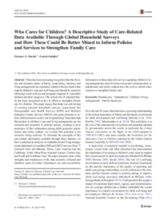Abstract
There has been increasing recognition that the diversity and dynamic nature of family composition, structure, and living arrangements are intimately related to the key factors that support children’s care and well-being and should be central to informing social policies and programs targeted to vulnerable children and their caregivers. The critical role of extended family has been recognized as key in efforts to strengthen family care for children.
This paper argues that better use and mining of existing national household surveys, particularly the Demographic and Health Surveys (DHS) and Multiple Indicators Cluster Surveys (MICS), has great potential to inform child protection policy and programming. Important data that pertains to children’s care and living arrangements are not extracted and presented in national reports, resulting in poor awareness of this information among child protection practitioners and policy makers. As a result, this potential is not currently being realized.
To illustrate the strengths of the care-related information available through these datasets, we have conducted an analysis on orphanhood and living arrangements data based on available DHS and MICS surveys from 77 countries from sub-Saharan Africa, Latin America and the Caribbean, North Africa/West Asia/and Europe, Central Asia, and South and Southeast Asia. The paper presents some of the strengths and weaknesses of the data currently collected and identifies areas for better information use and accessibility. Information in these data-rich surveys regarding children’s living arrangements must be better mined and communicated, so practitioners and policy makers have the tools to inform interventions to strengthen family care.

